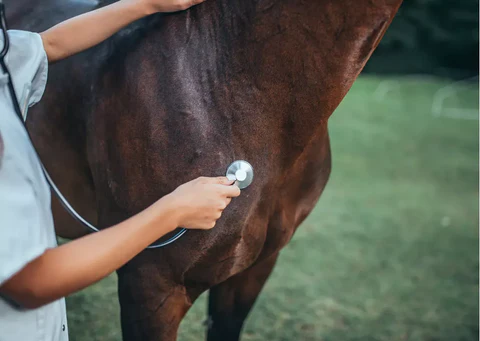Colic is a common problem in horses that can range from mild abdominal pain to a life-threatening condition. Recognizing colic symptoms is crucial for timely treatment of this condition.
How to recognize colic in your horse?
Some common signals that may indicate colic in horses are:
- Restless movements, sometimes accompanied by sweating
- Frequently lying down and getting back up
- Rolling on the ground
- Looking at the flanks
- Scraping the hooves on the ground
Possible causes of colic in horses:
- Obstipation colic can occur when the horse eats too much hay, has dental problems, and cannot chew its food adequately, or does not drink enough water.
- Gas colic is more common in spring due to the high fructan content in rapidly growing grass, which can ferment in the hindgut, producing gas.
- Spasmodic colic can occur with sudden changes in the diet or with worm infestation.
- Sand colic can occur when the horse accidentally ingests sand when the grass is too short.
- Displacement colic can occur with a sudden twist or displacement of the intestine. This is the most serious form of colic, as the blood supply to the intestines can be cut off, causing the intestine to die if left untreated.
What to do if your horse has colic?
If you suspect that your horse has colic, it is important to consult a veterinarian as soon as possible. In the meantime, it is advisable to walk your horse by hand, if possible. It is always a good sign if your horse produces manure.
Is colic always serious?
Not always. In many cases, colic will resolve on its own or can be treated with medication. In more severe cases, surgery may be necessary. Therefore, it is always important to consult a veterinarian to assess the problem.
What can you do to reduce the risk of colic?
To prevent colic in horses, there are several measures you can take. Here are some tips:
- Allow your horse to graze outside as much as possible. Horses that are on the pasture 24/7 generally have less chance of colic.
- Ensure that your horse gets enough exercise. This can help with healthy digestion.
- Always provide fresh drinking water. This is essential to prevent dehydration.
- Avoid sudden changes in the diet. Gradually transitioning to new roughage or concentrate can help prevent colic.
- Give extra hay when your horse grazes on a short pasture to prevent sand colic. Also, make sure your horse does not stand on a sand pit for too long without activity. Horses can eat sand out of boredom, which can lead to sand colic.
- Have your horse's teeth checked annually to prevent problems.
- Consult with your veterinarian about an appropriate deworming schedule.
- Support your horse's digestive health with Guts & Glory. This can help promote digestion and reduce the risk of colic.



